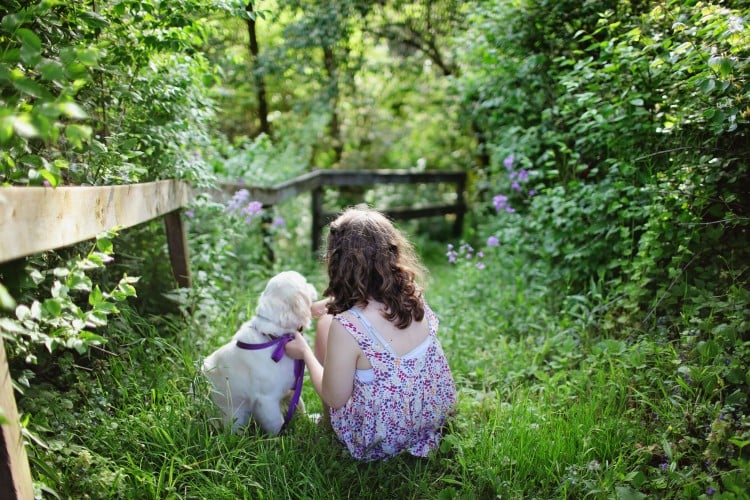Mindfulness as an adult can be very powerful, especially when life throws you on a roller coaster. It is so beneficial to simply concentrate on the present, and not dwell on the past or worry about the future. It allows you to find a place of clear thought where you can reflect on your current situation without judgement.
I have always used my garden as a place of mindfulness, especially during the last few years when faced with difficult circumstances. Nature has an amazing way of catching me when I fall. It’s through being in my garden that I’ve found my ultimate sanctuary and place of mindfulness. Now as my kids grow they too are enjoying the mutually exclusive relationship it has with them, especially during the ‘back to school’ time of year.
Some children feel enormous pressure when they are faced with the thought of re-entering the school environment. For my kids, they are successfully using our garden as their mindfulness place to help them focus on the present. This helps them acknowledge, accept and embrace where they are right now instead of dwelling on what could go wrong.
These simple techniques are a way for them to slow down their mind, accept what they cannot change, recognise this is all part of the process of returning to school, learn ways to rechannel their anxiety and learn from the experiences they have both in and out of school.
I know this all sounds a little sappy right now, but a few simple techniques to slow down and live in the present, will equip your kids with basic mindfulness skills they can carry through life.
Remember: Don’t expect them to get this concept straight away, it’s about building skills, leading them into a sanctuary where they feel safe and their mind can relax. Allow them to be in the moment with nature and feel the power of mindfulness. Before you know it, they will be leading you.
Our mindfulness techniques
1. Garden yoga
My mum was a yoga teacher for over 30 years. Until her late 60’s my mum used yoga as her form of meditation, to control breathing, improve mindset and strengthen her body. Today’s yoga has built on those core benefits and has also become a popular outlet for kids.
We have taken our yoga time out into the garden and use nature as our inspiration to relax and focus on the present.
o Being a butterfly
o Being a snail
o Being a flower
o Being a tree
o Being a bird
o Being a beetle
2. Garden senses
Lying quietly on a blanket we close our eyes and concentrate on our senses, especially sound. Once you close your eyes the sounds in your garden are amplified allowing you to tune in to the wildlife.When the kids identify an animal or insect, ask them to tell you a story about it.
Rub together a leaf and ask the kids what it feels like and how it smells. Can they recall smelling it before? Where and when? How does the scent make them feel?
Now it’s time to use their eyes. What can they see? How many different birds? Which sounds match which birds? Are they native?
Each time focus on different things. Some ideas include bee watching, counting ants, looking for worms, rock collecting, finding leaves, spotting flowers etc. Use nature as your inspiration.
3. Weather reporting
Starting with the actual weather outside, get the kids to use their senses to describe how the weather is today.
How does it look, feel and sound? We like to look at the weather from the garden’s perspective. Is it a good day in the garden? What would make it grow?
Now get the kids to share their personal weather forecast for the day. How do they look, feel, and sound today?
4. Grounding
This is so simple and very powerful for a child’s health and well-being. Grounding is the simple practice of taking their shoes off and connecting with the earth. Our body can be described as electrical equipment and the earth is full of electrical energy. Their feet (and yours) absorbs electrons from the earth and transfers them into your body.
Putting bare feet on the ground can help support the bodies cellular functioning, including the brain. In my opinion, the physical and mental benefits are unmatched and I have seen some amazing changes in my kids when they have come home from school and taken their shoes and socks off and stepped out into our garden.
When you think about a day in the life of a child it’s very disconnected from the ground. They wake up and step on insulated flooring in your home, they go to school in protective shoes, they play after school activities in shoes then they come home to an insulated floor in your home and go to bed.
Nature is so very powerful and once you learn how to harness the mind space it offers, it can truly be a place of sanctuary. A family garden is so much more that growing plants and food, it’s a place to grow within yourself and has an abundance of way to practice mindfulness.
So I encourage you to teach kid’s mindfulness from a young age and the ways nature can help them embrace the present. It doesn’t cost anything, its value is priceless and it has the ability to empower children in ways only Mother Nature can explain.





















-

-
-
mom206279 said
- 29 Jan 2018
-

-
-
mom90758 said
- 28 Jan 2018
-

-
-
Ellen said
- 28 Jan 2018

Post a comment1:31 pm
12:42 pm
7:30 am
To post a review/comment please join us or login so we can allocate your points.